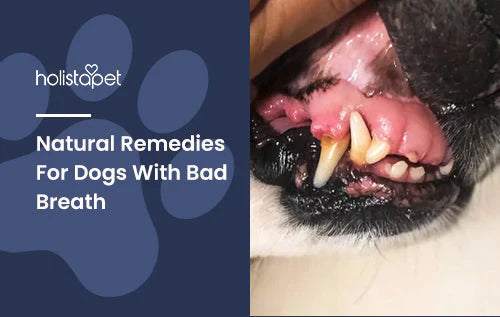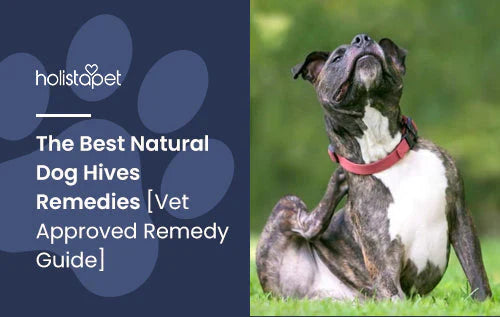As lovable as dogs can be, they don't have much respect for personal space. Pups love to share their kisses with anyone who is willing, and sometimes with those who are less than willing. Because of this, owners often find themselves up close and personal with their pup's mouth. There are few things more off-putting than being licked by a pup with stinky dog breath. Wet and messy kisses can be enjoyable if your dog isn't suffering from bad breath.
If your pooch suffers from this issue, there are likely dog bad breath home remedies out there for you. Much like humans, a dog's oral health can go bad for a number of reasons, such as dietary changes, unhealthy eating habits like coprophagia, metabolic diseases, plaque and tartar build-up, and careless oral treatment by owners. Home remedies for bad breath give owners the power to turn those abhorrent kisses into lovable licks once more.
Home Remedies for Dog Bad Breath
Pet parents often panic and take their fur babies to the vet right away, but you don't need to do this right away. There are many stinky dog breath home remedies, and luckily, they are all cheap and efficient.
Dental Chews
Many vets recommend dental chews to combat horrible dog breath, but it is important to know which chews to purchase for fresh breath. Dog dental chews that contain breath-freshening chlorophyll and coconut oil are best. Owners should look for products that include clove and cinnamon as well, two ingredients that also help with halitosis is humans.
Probiotics
Probiotics provide another efficient home remedy for bad breath in dog. It provides bacteria and yeasts that are good for your furry friend, especially the digestive system. Although when people think of bacteria they typically think negatively, probiotics are healthy bacterias that are good for both dogs and humans. Keeping your pet's stomach and mouth inhabited by probiotics will cause a noticeable positive effect on your dog's breath and overall health. Holistapet offers best probiotics for dogs.

Apple Cider Vinegar
Apple cider vinegar is a popular natural remedy for dog bad breath due to its potent antibacterial properties and the presence of malic and acetic acids. These acids help to neutralize the pH levels in your dog's mouth and combat odor-causing bacteria, which are often responsible for bad breath. Just add it subtly in your dog's food and you're good to go.
Causes Of Bad Breath in Dogs
There can be many different reasons for stinky dog breath, ranging from bad hygiene practices to serious health complications. Here is a shortlist of the most common culprits:
Bad Oral Hygiene
According to the American Kennel Club, the most common cause for bad dog breath is periodontal disease. Periodontal disease is caused by neglecting to brush a canine's teeth regularly. Generally, you should brush your pet's teeth at least 2 to 3 times per week. Neglecting a canine's oral hygiene results in a build-up of (smelly) bacteria in the mouth. That build-up can also be responsible for plaque and cavities.
Some Breeds Are More Prone
Surprisingly, some dog breeds are healthier than others. Small breeds may have longer life expectancies than most dogs but they are prone to dental problems. Many experts note that smaller dog breeds and brachycephalic breeds (which are characterized by their short-nosed, flat-faced features such as Pugs and Boston Terriers) are more inclined to periodontal and other mouth diseases because their teeth are closer together.
Health Issues
Metabolic disorders, such as diabetes, may also be the cause of bad dog breath. If your pup's bad breath has a sweet or fruity smell, diabetes may be the culprit. Diabetes may “suppress the immune system, allowing bacteria in the mouth to grow unchecked," states Dr. Steve Barghusen, DVM, of Pet Crossing Animal Hospital and Dental Clinic in Minnesota.
Kidney disease or failure is another metabolic disorder that can cause dog bad breath. It can result in an ammonia-like smell on your pup's breath. “The waste products that are normally eliminated by the kidneys build up in the bloodstream and then show up in the breath of affected individuals,” says Dr. Barghusen.
Eating Habits
Disgusting dietary habits may also be the reason why dog breath stinks. Some pups exhibit coprophagia, which is categorized as a dog's habit to eat feces. Pups have a gross habit of enjoying cat feces, and some dogs may eat their own excrement as well. Other pups may find themselves getting into the trash, or snacking on revolting items such as roadkill or animal corpses. By ingesting these sickening items, dogs can develop bad breath immediately.

Related Article: 9 Best Superfoods for Dogs
Prevention of Dog Bad Breath
Smaller breeds often need more precise and constant dental care than large breeds. Smaller dogs are more likely to develop periodontal disease. This is because smaller breeds have teeth that are more confined or close together, which increases plaque and tartar build-up.
Dental Care
There are several home remedies to help prevent dog's bad breath. The cheapest and easiest way to prevent bad breath is to brush your pup's teeth regularly. Brushing your dog's teeth reduces plaque and encourages excellent oral hygiene. There are some pups that may fight against getting their teeth brushed, but many dogs adjust with regular exposure to the task.
Oral Hygiene Pet Products
Other than that typical oral health products such as doggy toothbrushes and toothpaste, owners should invest in dental chews and water additives. Both can help facilitate good oral health for your pup, although owners should speak with their vet about which products would be best.
Proper Diet
Diet is also key to preventing dog bad breath. A quality, healthy, balanced diet will do wonders for your pup. By avoiding food and treats that can lead to metabolic disorders such as liver or kidney ailments, owners are positing themselves to stay one step ahead of their dog's diet, bad breath and other serious health issues.
Related Post: Home Remedies for Toothaches in Dogs
Final Thoughts - Natural Remedies for Dogs with Bad Breath
It is relatively easy and inexpensive to keep your pup's breath smelling fresh. Home remedies for dog bad breath can range from buying a pup proof trash to introducing chlorophyll into your pet's diet. By following the steps provided above, owners should be able to quell bad breath and enjoy getting kisses from their pup once more.
Routine teeth brushing and providing healthy chew toys may help owners avoid any issues with bad breath altogether. You can also try peanut butter dental sticks for dogs. Remember, it is always best to apply preventive measures whether or not your pet is experiencing bad breath of dog!


 CBD Oil for Dogs - Fast Acting
CBD Oil for Dogs - Fast Acting
 Chicken Flavored CBD Oil For Dogs - Easy Dose
Chicken Flavored CBD Oil For Dogs - Easy Dose
 Salmon Flavored CBD Oil For Dogs - Highly Rated
Salmon Flavored CBD Oil For Dogs - Highly Rated
 CBG Oil for Dogs and Cats - Loved by Thousands
CBG Oil for Dogs and Cats - Loved by Thousands





Leave a comment
All comments are moderated before being published.
This site is protected by hCaptcha and the hCaptcha Privacy Policy and Terms of Service apply.